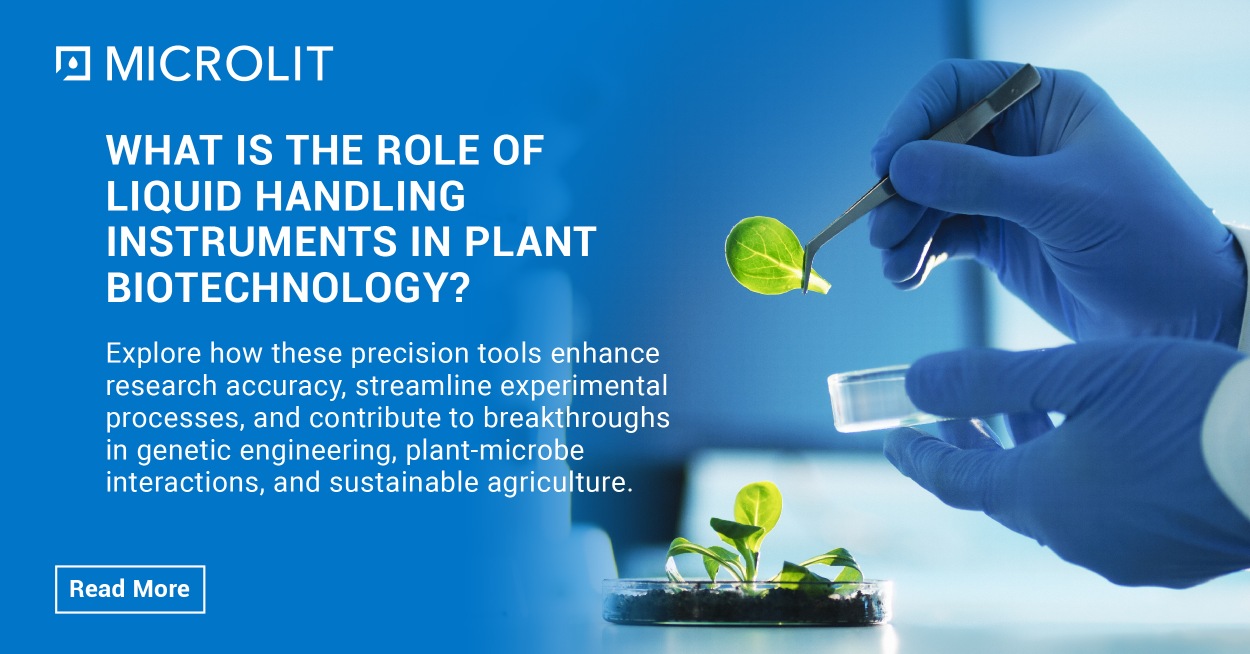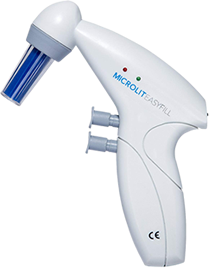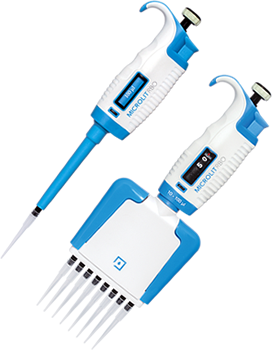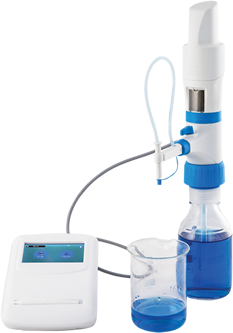Plant biotechnology is a cutting-edge field that utilizes technology and scientific methods to improve plant species for various applications, including agriculture, medicine, and environmental sustainability. Key to these advancements are liquid handling instruments, such as micropipettes, bottle top dispensers, burettes, and consumables.
These tools are essential for the accuracy and efficiency required in plant biotechnology processes. This article explores the vital role these instruments play in plant biotechnology, focusing on their use in genetic engineering, tissue culture, high-throughput screening, proteomics, and quality control.
What is Plant Biotechnology?
Plant biotechnology is a cutting-edge field that combines biology and technology to modify plants for specific purposes. By manipulating genetic material, scientists can enhance desirable traits such as increased yield, disease resistance, and drought tolerance. Techniques like genetic engineering, tissue culture, and molecular breeding play pivotal roles in this process.
For example, genetically modified crops like But cotton are engineered to resist pests, reducing the need for chemical pesticides. Plant biotechnology not only boosts agricultural productivity but also contributes to environmental sustainability by reducing the carbon footprint of farming practices. Additionally, it offers solutions for improving the nutritional content of food, addressing global challenges like malnutrition.
With ongoing advancements, plant biotechnology holds great promise for securing food resources and supporting a growing population in an eco-friendly.
Role of Liquid Handling Instruments in Plant Biotechnology
Liquid handling instruments are crucial in plant biotechnology for precise measurement and transfer of liquids. They enable accurate genetic transformations, media preparation, and molecular analyses. These tools streamline processes like tissue culture and high-throughput screening, enhancing research efficiency and ensuring reproducibility in plant biotechnology experiments.
-
Genetic Engineering and Transformation
Genetic engineering is a fundamental aspect of plant biotechnology, involving the alteration of plant DNA to introduce desirable traits like pest resistance or enhanced nutritional value. This process heavily relies on precise liquid handling to manage small volumes of DNA samples, enzymes, and buffers. Micropipettes are crucial in this context, allowing scientists to accurately dispense these components during procedures like CRISPR-Cas9 gene editing and Agrobacterium-mediated transformation.
The precision provided by micropipettes ensures that the transformation agents are delivered correctly, minimizing errors and maximizing the success rate of gene integration. This accuracy is vital for developing genetically modified organisms (GMOs) that meet specific agricultural needs, such as increased yield or drought tolerance.
-
Tissue Culture and Micropropagation
Tissue culture and micropropagation are essential techniques in plant biotechnology for cloning plants, conserving genetic resources, and developing new varieties. These methods require the precise preparation and handling of culture media and growth regulators, which are facilitated by liquid handling instruments.
Bottle top dispensers and Burettes are used to prepare culture media with consistent concentrations of nutrients and hormones. This consistency is critical for the successful growth and development of plant tissues in vitro. Micropipettes are also used to transfer small volumes of plant hormones and antibiotics into the culture media, ensuring optimal conditions for tissue development and plant propagation.
Maintaining sterility is crucial in tissue culture to prevent contamination, which can compromise the cultures. Liquid handling instruments help maintain sterile conditions by enabling the precise and aseptic transfer of liquids, such as sterilizing agents and culture media, into culture vessels. This ensures the success of tissue culture experiments and the propagation of healthy plant clones.
-
High-Throughput Screening in Plant Biotechnology
High-throughput screening (HTS) is a powerful technique in plant biotechnology that enables the rapid assessment of biological or biochemical activities across numerous samples. This method is crucial for identifying new plant traits, developing pest-resistant crops, and discovering plant-derived compounds for medicinal use.
Automated liquid handling systems are key to HTS, allowing for the accurate and efficient processing of thousands of samples. These systems can dispense precise volumes of reagents and samples in microplate formats, facilitating simultaneous testing under multiple conditions. The use of automated liquid handlers reduces the risk of human error, ensuring consistent and reproducible results in screening processes.
For example, in herbicide resistance testing, HTS can evaluate the effectiveness of various compounds on different plant varieties. Automated systems distribute these compounds across a large number of samples, enabling researchers to quickly identify the most promising candidates for further development.
-
Proteomics and Metabolomics: Analyzing Plant Biochemistry
Proteomics and metabolomics are fields focused on analyzing the full range of proteins and metabolites in plants, providing insights into plant physiology, stress responses, and metabolic pathways. Liquid handling instruments are crucial for the sample preparation stages in these studies.
During proteomic and metabolomic analysis, accurate extraction and preparation of samples are critical. Micropipettes are used for the precise addition of solvents and reagents needed for protein and metabolite extraction. This ensures that samples are properly prepared for downstream analytical techniques such as mass spectrometry and chromatography, which require consistent sample quality for accurate data interpretation.
-
Quantitative Analysis and Quality Control in Plant Biotechnology
Quantitative analysis is fundamental in plant biotechnology for assessing the concentration of DNA, proteins, and metabolites. Instruments like spectrophotometers, often used alongside liquid handling tools, play a significant role in this analysis.
Micropipettes are essential for preparing standard curves and calibrating analytical instruments, ensuring accurate quantification of biomolecules. They also facilitate the preparation of samples for analysis, maintaining consistency in sample volumes and concentrations. This precision is vital for generating reliable and reproducible data, which is crucial for quality control and validation of biotechnological processes.
Conclusion
Liquid handling instruments are integral to the success of plant biotechnology, enabling precise and efficient workflows across various applications. From genetic engineering and tissue culture to high-throughput screening and proteomics, these tools ensure the accuracy and reliability of experimental results. As the field of plant biotechnology continues to advance, the demand for high-quality liquid handling instruments will grow, further emphasizing their importance in research and development.
Investing in reliable liquid handling equipment and ensuring their proper use can significantly enhance research outcomes, contributing to breakthroughs in agriculture, medicine, and environmental sustainability. By leveraging these tools, researchers can continue to innovate and address global challenges such as food security, climate change, and sustainable resource management.
Microlit: Offering a Comprehensive Range of Liquid Handling Instruments
Microlit stands at the forefront of liquid handling technology, offering a comprehensive array of instruments tailored for precision and accuracy in laboratory settings. With a focus on cutting-edge innovation, Microlit provides advanced solutions such as Micropipettes, bottle-top dispensers, electronic burettes, Pipette Fillers, etc., each is meticulously designed for optimal performance.
Their products feature sophisticated calibration mechanisms and ergonomic designs to minimize user fatigue while ensuring exact measurements. These instruments are vital for applications ranging from molecular biology and analytical chemistry to plant biotechnology, ensuring that Microlit remains an essential partner for researchers seeking accuracy and reliability in liquid handling.
To learn more about Microlit products, please email us at info-usa@microlit.com or visit the Microlit products page https://www.microlit.us/shop/.






 3209
3209





